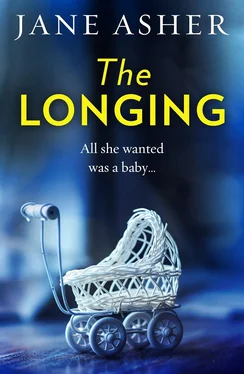Michael was a clever, honest and hard-working businessman, and Juliet’s job in an upmarket firm of estate agents was well suited to her good taste and persuasive manner. She was a popular and successful member of the team, but as she and Michael had known from shortly after their first serious conversation that they both wanted children, she only gave it a limited proportion of her attention and effort. She was quite prepared for a time when she would have to set her career aside – at least until the little Evanses were happily ensconced in the obligatory boarding schools – to concentrate on the important tasks of running a good home, nurturing an admirable, high-earning, respectable husband and bringing up a brood of future useful Englishmen – or women.
When they first moved into the neat terraced house in Battersea a few months after their wedding they both mentally set aside a small light room on the top floor as a future nursery, assuming its occupant would arrive within a few years as easily and comfortably as everything else had so far done in their short, enjoyable courtship and marriage. As time went by and no hint appeared of impending offspring, a tiny little feathery sensation of fear began to flutter occasionally deep within Juliet. After some nine years of conventionally happy, sexually active if unexciting marriage, the flutter had become the beat of heavy wings – and Juliet began to admit to herself that something unspeakable was hovering on the edges of her well-planned, smoothly run adult life, threatening to throw it off balance with the strong gusts of unease it created.
Although she herself was becoming increasingly aware of this shadow lurking at the edges of her everyday life, it was the reactions of those around her that made it difficult to carry on as if no problem existed.
Her mother, in particular, made her feel horribly awkward about the lack of babies and, never the most tactful of women, was extraordinarily accurate in pinpointing the most humiliating moments to drop heavy hints about this shortcoming in her daughter’s achievements. Juliet had once made the fatal mistake of quietly admitting to her that she and Michael were disappointed not to have so far produced any children, and she had regretted it ever since, sensing that – behind the show of sympathy and understanding – it had given her mother another little weapon to use against her.
‘Well, after all it’s not as if I had any grandchildren to leave it to when it comes to mine,’ Mrs Palmer volunteered in the middle of a discussion about wills at one of her dinner parties. As the average age of her guests, apart from Michael and Juliet, was as usual somewhere in the seventies, this jolly subject was fairly typical of those raised around the Palmer table.
‘Everyone should make one, of course,’ added Michael, carefully ignoring the reference to his lack of contribution to the family dynasty. ‘It’s surprising how many people don’t bother, and then leave their spouses with the most complicated situa—’
‘Yes, but I don’t have a spouse, you see. My daughter is all I’ve got,’ ploughed on Mrs Palmer, turning to smile sweetly at Juliet as she underlined her point with the subtlety for which she was famous, ‘all I’ve got. Apart from you, Michael dear, of course. It’s not as if there were any young ones to benefit from my savings. I’d always thought there might be schooling and so on to help with, of course. Even my dear dog isn’t with me any more.’
Michael and Juliet had adopted the Palmers’ black labrador three years previously. Mr Palmer’s death had meant a move for his widow from the large house in Hertfordshire to a London service flat, and to keep the family pet would have been impossible. Juliet, hating the idea of giving her away, had begged Michael to let the dog live with them, and in spite of it necessitating complicated arrangements for having her collected by a friend each day while they were at work, he had agreed. But Mrs Palmer saw the transferring of Lucy as entirely to their benefit, and had never once expressed any thanks for their having taken over the responsibility. At the time, Michael and Juliet had put it down to the recent bereavement, but as the years went by and Mrs Palmer still complained self-pityingly about the old dog’s. absence, Juliet found it increasingly irritating.
Her relationship with her mother was an extraordinary mixture of closeness and utter separateness, and it sometimes appeared to her that Mrs Palmer deliberately chose to hurt her in order to re-establish some kind of power over her. Juliet became adept at brushing aside the references to missing grandchildren, not only because she found them disturbing, but also because treating them with any seriousness made the awful possibility of a genuine problem more real.
But the afternoon she caught Michael looking longingly out of the window at some small boys playing football outside the flats that backed on to their house, she knew something must be done. She walked up quietly to stand just behind him, and followed his gaze towards the laughing children.
‘What is it?’ she asked, not needing an answer, but half hoping they could bring the unspoken problem out into the open.
He jumped guiltily when he became aware of Juliet behind him. ‘I was just wondering if I needed an overcoat. It’s clouded over again.’
‘Oh Michael, for heaven’s sake.’
‘What?’
‘You know.’
If Michael was worried enough to protect her from his consciousness of there being something wrong, then Juliet knew it was time she herself turned and confronted it. Later that evening she studied again the magazine articles and chemist’s leaflets that she had hoarded in her bedside drawer.
‘I’ve bought an ovulation thermometer,’ she announced as she came in from work the next day.
‘What?’
‘It’ll give me an idea when I’m ovulating, and we can make an extra effort, if you see what I mean.’
‘I see exactly what you mean. It sounds delightful. I suggest you take your temperature this minute,’ said Michael, as he threw his jacket on to the sofa and began to undo his shirt buttons.
‘Michael, what are you doing?’ laughed Juliet. ‘Don’t be so silly. It isn’t instant like that, as I’m sure you know perfectly well. No, stop it – I want to read the instructions,’ she said as she wriggled out of his grasp and sat down, moving his coat on to the arm of the sofa. ‘Now look – it’s in a sort of huge scale – see? So I can—’
‘Come here, my dear,’ Michael interrupted, as he sat down beside her and slipped a hand inside her blouse, ‘and I shall personally undertake a particularly thorough examination. I’m sure we can sort out your internal problems in a jiffy.’
‘Darling, shut up. Listen. My temperature will go up immediately after ovulating and – hang on.’ She read on to herself for a moment or two, frowning a little. ‘Well, that’s a fat lot of good, isn’t it? We’ve got to make love like mad just before and during ovulation, and my temperature’s going to go up just afterwards. What good is the thermometer if it’s going to tell me when we’ve just missed it for God’s sake?’
‘I can see a perfectly simple answer. We make love more or less permanently until your temperature goes up, take a few days off to get up our strength, then start again. Don’t you think?’
Juliet smiled but went on reading. ‘I’ve got to fill in the chart and put in little crosses when it goes up. Yeah, yeah, I see the point. I’ll get to know my cycle and all that. And I suppose at least I’ll know that I am ovulating.’ She turned to look at Michael. ‘I do love you, you know. Even if you haven’t got me up the spout yet. Come to think of it, who’s to say it’s me? Perhaps your sperm are a bit wimpish?’
Читать дальше












